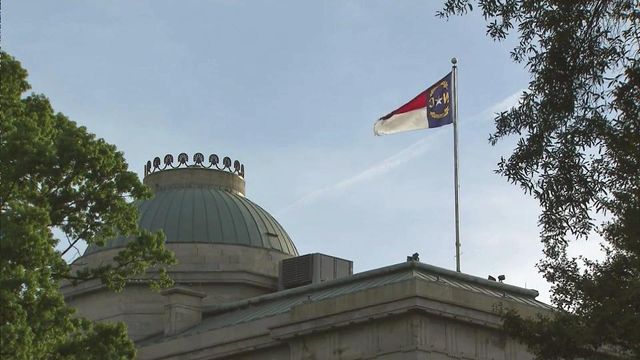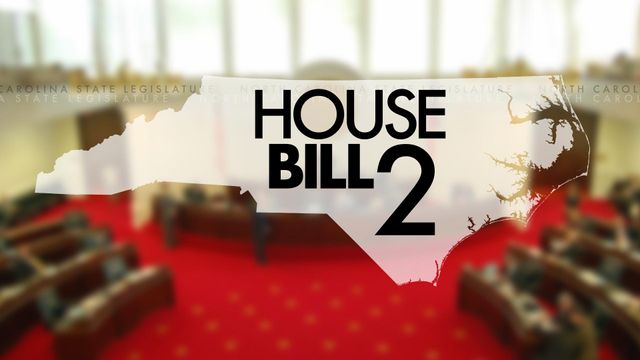McCrory, lawmakers want courts to declare HB2 doesn't discriminate
Gov. Pat McCrory is asking a federal court to declare that the controversial House Bill 2 does not discriminate against gay, lesbian, bisexual or transgender people.
Posted — UpdatedLawyers for the governor filed the declaratory judgment action Monday morning, and Republican legislative leaders filed their own action hours later.
"We believe a court, rather than a federal agency, should tell our state, our nation and employers across the country what law requires," McCrory said during an afternoon press conference. "Right now, the Obama administration is bypassing Congress by attempting to rewrite the law."
The governor said he wants Congress "bring clarity" to nondiscrimination provisions in Title VII of the Civil Rights Act and Title IX of the Education Amendments Act of 1972.
"Our nation is dealing with a very new, complex and emotional issue: How to balance the expectations of privacy and equality in one of the most private areas of our lives," he said.
His filing asks that federal courts declare that House Bill 2 does not violate federal workplace discrimination laws, while the lawmakers' filing focuses on Title IX.
"It’s unacceptable for the Obama administration to try to intimidate North Carolina taxpayers into accepting their radical reinterpretation of a law meant to protect women from discrimination into a law that would actually deny women their right to basic safety and privacy," House Speaker Tim Moore and Senate President Pro Tem Phil Berger said in a joint statement. "What the Obama administration is arguing has never been written into law by Congress or settled in the courts, and that is why we are seeking clarity – to confirm we remain in compliance with federal law."
If the federal government's action goes unchallenged, billions of dollars in federal funding for public schools, universities and other functions of state government could be at risk. That's because the federal government enforces its policies by withholding funding from states.
McCrory's action drew immediate criticism from the law's opponents.
"If the governor really wants to provide leadership here, it’s not by digging in his heels. It’s by working with this General Assembly to work this very week to repeal House Bill 2. That is the only answer here," said Chris Sgro, executive director of Equality NC. "That’s the only way we’re going to save our federal funding and it’s the only way that we’re going to bring the Paypals of the world back."
PayPal is one of a number of businesses that have called on the state to reverse House Bill 2 and part of a litany of high-profile individuals and businesses, including Bruce Springsteen and the NBA, to criticize the state. Backers of the bill insist that, whatever the economic price, North Carolina should pay it to defend the law, which they say protects women and children.
A pair of private lawyers and McCrory's general counsel, Robert Stephens, filed the declaratory judgment action on behalf of the state. Attorney General Roy Cooper, a Democrat who is running for governor against McCrory, a Republican, has refused to defend the law in court.
The McCrory campaign quickly politicized the court action by criticizing Cooper's position.
"North Carolina hired Roy Cooper to be its full-time lawyer but instead got a full-time politician," Russell Peck, McCrory's campaign manager, said in a statement. "Instead of doing his job to defend the state against unprecedented threats from the federal government, Roy Cooper decided to team up with Washington, D.C., and out-of-state special interests seeking to do harm to North Carolina rather than standing up for our families and businesses."
Cooper's campaign responded with a short video in which Cooper asks McCrory to "set politics aside and undo this discriminatory law now."
Stephens said officials hope to have a federal judge rule on the matter quickly and at little cost to taxpayers.
The General Assembly passed the controversial law – titling it the Public Facilities Privacy and Security Act – on March 23. Lawmakers said it was a reaction to a Charlotte ordinance that would have required private businesses and public facilities to allow transgender people to use the bathroom of their choice.
However, House Bill 2 addresses much more than bathrooms. It lays out a state nondiscrimination policy but does not protect LGBT people under that policy. While local governments can adopt their own policies for their employees, House Bill 2 prohibits them from extending those policies to private-sector businesses either through ordinances or rules governing things like contracting, housing discrimination and the like.
The bill also appears to do away with the ability of North Carolina workers to sue their former employers for wrongful termination based on discrimination of all sorts, including race and age, as well as LGBT status.
Shortly after House Bill 2 passed, McCrory signed an executive order purporting to ameliorate some of its effects. One of the most meaningful parts of that order extends protections to LGBT state workers, saying that state policy bars "unlawful discrimination, harassment or retaliation on the basis of race, religion, color, national origin, sex, sexual orientation, gender identity, age, political affiliation, genetic information or disability."
But the federal government's letter to the state last week and this legal action by McCrory focuses almost exclusively on the bathroom provisions and their implications for discrimination in the workplace and in educational settings.
"North Carolina does not treat transgender employees differently from nontransgender employees. All state employees are required to use the bathroom and changing facilities assigned to persons of their same biological sex, regardless of gender identity, or transgendered status," the declaratory judgment action states.
Stephens said federal law doesn't single out transgender people for discrimination protections, so House Bill 2 cannot violate the law.
"This is a letter from the Department of Justice," he said. "In spite of what this letter says to us, the class of people that the Justice Department is referring to are not a protected class under Title VII, and until Congress changes that, that's the law. Our bill, therefore, doesn't violate that."
Still, critics of House Bill 2 decried McCrory's action, saying he was merely delaying the inevitable.
"The idea Governor McCrory is going to waste even more time and millions more taxpayer dollars defending it is reckless and wrong," Chad Griffin, president of Human Rights Campaign, said in a statement. "HB2 is a vile law attacking transgender North Carolinians and leaves many more unprotected from discrimination. Rather than defending it, Governor McCrory should be working with state lawmakers to fix the mess he’s created."
Supporters countered that the Obama administration was trying to bully the state.
"Americans deserve to be governed by those who uphold and follow the law. Instead, the Obama administration continues to illegally distort the law and ignore legal precedent to benefit powerful Washington lobbying groups at the expense of the people of North Carolina," Kellie Fiedorek, legal counsel for Alliance Defending Freedom, said in a statement.
"People of faith throughout the country support Governor McCrory and the people of North Carolina in this lawsuit and for standing up for privacy and safety and standing up to the corporate and government bullies who are attempting to usurp the will of the people of North Carolina and enact their far left agenda through coercion and force," Timothy Head, executive director of the Faith & Freedom Coalition, said in a statement.
House Bill 2 is already the subject of a civil lawsuit hoping to derail the law. On April 20, Joaquín Carcaño, one of the plaintiffs in the case brought by the ACLU and Lambda Legal Foundation, filed a charge alleging violations of Title VII with the Equal Employment Opportunity Commission.
"Transgender people work for the state of North Carolina, attend school in North Carolina and are a part of every community across the state," representatives of the groups said in a joint statement. "It is unconscionable that the government is placing a target on their backs to advance this discriminatory political agenda. Lawsuits are normally filed to stop discrimination – not to continue it."
Related Topics
• Credits
Copyright 2024 by Capitol Broadcasting Company. All rights reserved. This material may not be published, broadcast, rewritten or redistributed.






